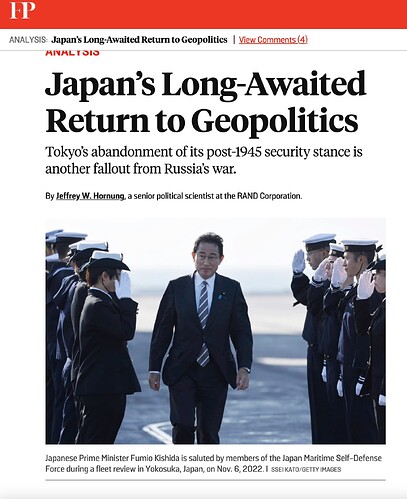-
日本正在重返主要的地缘政治,这一转变的标志是对其1945年后安全态势的大部分内容进行了修订。
-
日本新的国家安全战略、国防战略和国防建设计划分别于2022年12月和今年1月发布。
-
日本的新战略思想在与美国总统拜登和其他美国官员的联合声明中得到了充分展示。
-
日本计划在五年内将国防开支增加近60%,放弃早在20世纪70年代出于政治目的设置的占国内生产总值1%的非正式预算上限。
-
这一转变表明,日本更愿意也更有能力参与到超越其狭隘的防御性利益的地缘政治问题中,并且更有可能以与其战略地位、地区利益和经济实力相称的方式行事。
-
日本寻求在其一系列军事装备之外获得反击导弹。
-
日本正在将他们的安全利益扩大到保卫自己的岛屿之外,建立一个 “自由和开放的印度-太平洋”。
-
对日本安全的改变在日本或该地区引起了令人惊讶的反对,辩论从是否应该采取这些行动转移到如何支付这些行动。
-
日本不再是其他国家安全的受益者,而有可能自己成为安全的提供者。
-
鉴于朝鲜的威胁以及俄罗斯和中国的行动,日本最近采取措施加强其防御能力,这一点是可以理解的
-
日本转变的动机有两个方面:对一个较大的邻国进行良好的防御,并保护其免受中国的欺凌、挑衅、胁迫和对国际法的不尊重。
-
日本越来越多地把冲突看作是一种永远存在的风险,并表示乌克兰可能是明天的东亚。
-
预计日本将加强与澳大利亚的防务关系,可能是通过防务演习,更紧密地协调对太平洋岛国的发展援助,以及与美国一起进行战略协调。
-
日本与韩国的关系似乎正在改善,共同的安全关切可能使东京与首尔在防务方面的合作更加紧密。
-
日本可能会与主要的欧洲盟友建立更紧密的关系,包括同意定期参加北约会议,并与英国联合开发先进的战斗机。
-
由于对中国的共同安全关切,日本还可能与菲律宾建立更紧密的安全关系。
-
日本已承诺开展 “积极的外交”,以促进一个理想的安全环境,但这是什么样子的还不清楚。
-
在东南亚,日本的新战略表明它可以采取更多的领导地位,帮助小国反击中国。
-
日本在台湾海峡明确表示的利益需要转化为行动。
-
在地缘政治的现实和曾经的假设现在已经成为可能的认识的促使下,日本已经着手改变几十年来的战略思维,开始采用新的安全方法。
-
华盛顿没有胁迫东京增加其国防开支,但现在是对其安全采取新方法的时候了。
-
Japan is making a return to major geopolitics, a shift that is being marked by the revision of large parts of its post-1945 security posture.
-
Japan’s new National Security Strategy, National Defense Strategy, and Defense Buildup Plan were released in December 2022 and January of this year.
-
Japan’s new strategic thinking was on full display in joint statements with U.S. President Joe Biden and other U.S. officials.
-
Japan plans to increase defense spending by nearly 60 percent over five years, abandoning an informal budget cap of 1 percent of GDP put in place for political purposes back in the 1970s.
-
This shift signals a Japan that is more willing and capable of involving itself in geopolitical issues beyond its narrow, defensive interests and more likely to act in ways commensurate with its strategic position, regional interests, and economic might.
-
Japan seeks to acquire counterstrike missiles in addition to their array of military equipment.
-
Japan is expanding their security interests beyond the defense of their own islands with a ‘free and open Indo-Pacific’.
-
Changes to Japan’s security have elicited surprisingly little opposition in Japan or the region, with debate shifting from whether the actions should be taken to how they will be paid for.
-
Japan is becoming less a beneficiary of security provided by others, and potentially more a security provider itself.
-
Japan has recently taken steps to bolster its defense capabilities, which is understandable given North Korean threats and the actions of Russia and China
-
The motivation for Japan’s shift is twofold: to be well defended against a larger neighbor and to protect against China’s bullying, provocation, coercion, and disrespect for international law
-
Japan is increasingly viewing conflict as an ever-present risk and has stated that Ukraine may be the East Asia of tomorrow
-
Japan is expected to strengthen its defense ties with Australia, likely through defense exercises, closer coordination of development assistance to Pacific Island nations, and strategic coordination in conjunction with the United States.
-
Japan’s ties with South Korea appear to be improving, and common security concerns may allow Tokyo to work closer with Seoul on defense.
-
Japan is likely to pursue closer ties with key European allies, including an agreement to participate in NATO meetings on a regular basis and joint development of an advanced fighter jet with the UK.
-
Japan is also likely to have even closer security ties with the Philippines due to common security concerns over China.
-
Japan has pledged to carry out “vigorous diplomacy” to foster a desirable security environment, but what this looks like is unclear.
-
In Southeast Asia, Japan’s new strategy suggests it could take on more of a leadership position to help smaller states push back against China.
-
Japan’s explicitly stated interests in the Taiwan Strait need to be translated into action.
-
Japan has moved to change decades of strategic thinking and embark on a new approach to security, prompted by the reality of geopolitics and the realization that what was once hypothetical is now possible.
-
Washington did not coerce Tokyo into increasing its defense spending, but the time for a new approach to its security is now.
1 个赞
